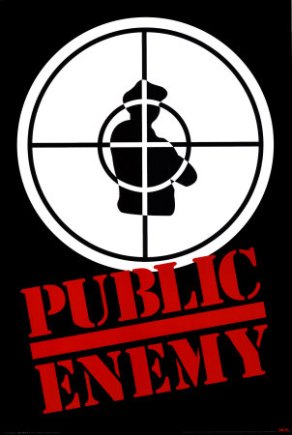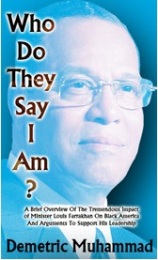Did Minister Louis Farrakhan Give Birth To Hip Hop ?
“Environment shapes heredity.” Hon. Elijah Muhammad
The Scholars On The Origin of Rap/Hip Hop Music
Rap music has had a profound impact on the African American community in the United States. Its greatest significance, to my mind, derives from the fact that it has fostered a profound nationalism in the youth of Black America. Arguably, hip-hop has become a conduit for African American culture to a greater extent than even jazz. Where the latter could, through its polyrhythmic syncopations, embrace both the nuances and jagged edges of the collective Black experience, it could not self-consciously energize the nationalist ethos in quite the way the more lyrically focused hip-hop does.
Hip-hop, or rap music, began in the early 1970s. The first synthesis of self-conscious poetry and music can be traced, most directly, to the Black nationalist Last Poets. Their albums The Last Poets, Chastisement, This is Madness, and others have become classics in the African American community. When one member who separated from the group, with the stage name “Lightning Rod,” used a musical score provided by Kool & The Gang as a backdrop to his lyrical narrative of a day in the life of two hustlers, he had no idea he was laying the basis for an entirely new musical genre. This album, Hustler’s Convention, was a mainstay in the album collection of a South Bronx DJ named Kool Herc. Almost to a person, it is agreed that hip-hop began with Kool Herc. –Errol A. Henderson, Black Nationalism and Rap Music
As the limitations of electoral politics became glaringly and painfully apparent to the post-civil rights generation, rap artists idolized the words and works of political personalities such as Marcus Garvey, Malcolm X, and Louis Farrakhan, men whose uncompromising public personae and urban, poor/working-class roots stood as an example to those young black men whose status was undermined in the postindustrial capitalist economy. “God knows, when I heard Farrakhan, I had never heard a black man talk like that. It blew my mind, absolutely blew my mind,” Hip Hop journalist/activist Kevin Powell recalled of his introduction to Farrakhan during the mid-1980s. “It was intoxicating, as intoxicating as crack was for a lot of people in our community in the ’80s.”-Charise Cheney, “Revolutionary Generation”: (En) gendering the Golden Age of Rap Nationalism
The Nation of Islam is generally acknowledged as having a deep influence on rap music. Rappers such as Poor Righteous Teachers, King Sun, Brand Nubian, Movement Ex, and Public Enemy, frequently quote and draw inspiration from the Honorable Elijah Muhammad (founder of the Nation of Islam), Malcolm X, and Minister Louis Farrakhan. The famed boxer, Muhammad Ali, was also an early rapper.-Catherine Tabb Powell, Rap Music: An Education with a Beat from the Street
Musician Grandmaster Flash defined hip hop as “the only genre of music that allows us to talk about almost anything. Musically, it allows us to sample and play and create poetry to the beat of the music. It’s highly controversial, but that’s the way the game is.” Hip hop culture began in the 1970s in the Bronx, N.Y., among African-American, Latino, and Caribbean youth who created intercultural crews (“new kinds of families”) of MCs/rappers, disc jockeys, break dancers, and graffiti artists whose art and style expressed resistance to postindustrial conditions and the destruction of jobs, affordable housing, and support systems in working-class black and Latino neighborhoods at the beginning of the Ronald Reagan-George H.W. Bush era.-Professor Richard Brent Turner, The Influence of Malcolm X and Martin Luther King Jr. on Hip Hop
The real significance of hip-hop is not, however related to those rappers(amoral and obscene), but rather to the religio-politically oriented “message rap” artists, who have steadily found success since the mid-1980s….The Hip-Hop movement’s role in popularizing the message of Black militant Islam cannot be overestimated. What reggae was to Rastafarianism in the 70’s…Hip Hop is to the spread of Black Islam in the 80’s and 90’s….Expressing thanks and support for the Nation of Islam and Louis Farrakhan has become almost standard practice on the rap albums, and long quotations from NOI literature are often included in the lyrics. -Professor Mattias Gardell, In The Name of Elijah Muhammad Louis Farrakhan and The Nation of Islam
Connecting The Dots on Minister Farrakhan’s Presence At Hip Hop’s Genesis
Hip Hop Born in New York circa 1972-All scholars and students of Hip Hop history agree that this musical art form began in the early 1970s in New York City. The Honorable Minister Louis Farrakhan was then the Minister of Temple No.7 in New York. His influence was transmitted to all of the Black citizens of New York via his 5,000 followers and his 18 satellite Temples of Islam. The Minister was also being heard on the radio 6 times per week. Such a wide and far reaching presence easily made him one of the most influential forces in all of New York City. This is important when you consider that environment shapes heredity. Minister Farrakhan’s ministry was saturating the collective consciousness of Black and Hispanic New Yorkers with the revolutionary message found within the teachings of the Most Honorable Elijah Muhammad.
The Presence of Caribbean DJs help start the music– New York has long been a haven for Caribbean immigrants. Minister Farrakhan is connected to the Caribbean peoples through his parentage; his mother being from the Island of Nevis and his father being from Jamaica. The Minister has spoken often in the Islands and received warmly as a native son and head of state.
Hip Hop as hybrid of spoken word and performance art- Hip Hop is a unique and attractive art form. It is a hybrid or mixture of spoken word, performance art and musicianship. In this way it bears the definite imprint of the Farrakhan influence. For it is Minister Farrakhan’s professional career where he has demonstrated mastery in both spoken word-as the towering figure known quite simply as The Minister- and musicianship-where he has performed and still plays classical violin. Hip Hop is Minister Farrakhan’s baby. Rappers to this day pay homage to him and see him as the peacemaker and strong man for Black people.
Hip Hop As Music With A Message-As Professor Mattias Gardell points out Hip Hop begins as ‘message rap.’ Throughout the history of hip hop artists have written lyrics to include urban social commentary, revolutionary manifestos and homage to the giants of the Black liberation struggle. This characteristic of the Hip Hop culture is directly reflective of the ministry of the Honorable Minister Louis Farrakhan. Public Enemy’s Chuck D once wrote “Farrakhan’s a prophet that I think you ought to listen to, what he can say to you, what you ought to do, is follow for now…” Hip Hop’s revolutionary, truth to power quality is more evidence of the influential role of Minister Louis Farrakhan. His mighty ministry in New York City during the 1970’s created a unique climate in New York where cultural, educational and artistic trends were born. To that end we consider the Honorable Minister Louis Farrakhan the Godfather of the Hip Hop cultural phenomenon.
Fore More Download Our New E-book:
Who Do They Say I Am?
Download at www.researchminister.com



